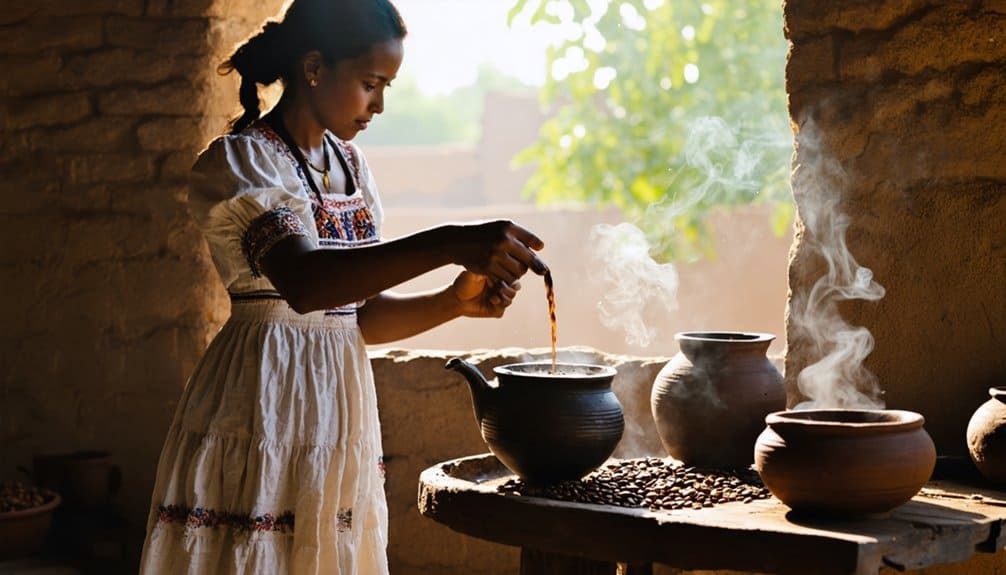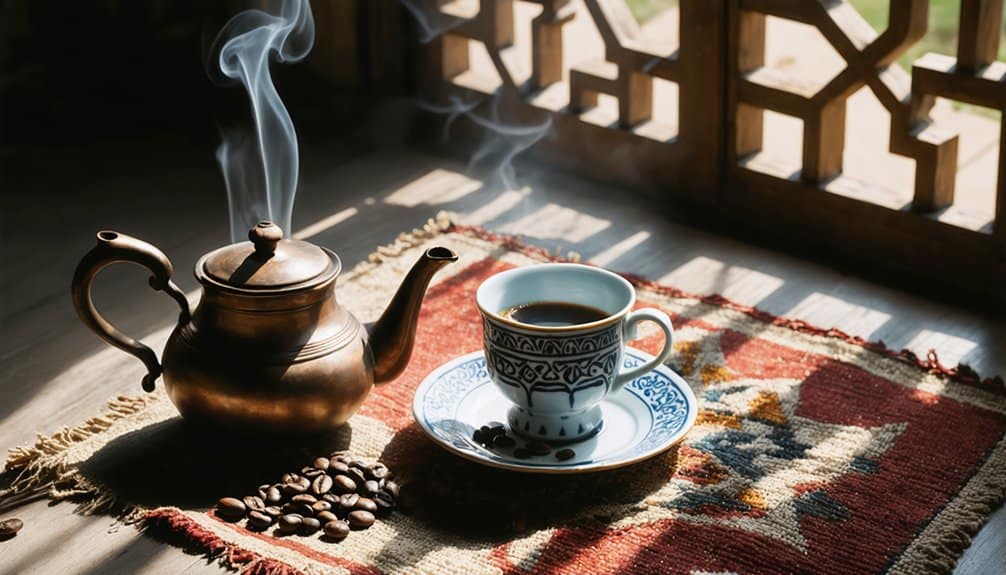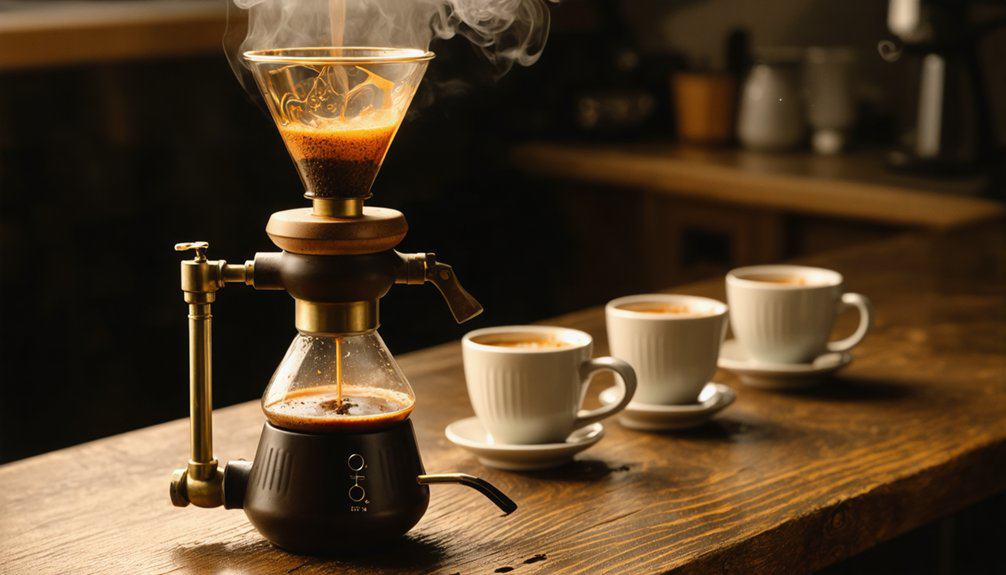You’ll uncover rich coffee traditions spanning continents, each offering unique cultural insights.
Ethiopia’s ceremonial coffee preparation involves three rounds of brewing with incense and community gathering. Italy’s espresso culture transforms cafes into social hubs, while Turkish coffee reveals fortunes in its grounds.
Sweden’s fika mandates mindful coffee breaks, and Japan’s siphon brewing raises coffee to an art form. These rituals hold centuries of wisdom waiting to be examined.
Key Takeaways
- Ethiopian coffee ceremony involves three rounds of freshly roasted coffee accompanied by incense, fostering community bonds and cultural connections.
- Italian espresso culture centers around social bars where perfectly extracted shots create gathering spaces throughout the day.
- Turkish coffee combines rich brewing with fortune-telling traditions, offering both a beverage and glimpse into possible futures.
- Swedish fika mandates daily coffee breaks with treats, promoting workplace wellness and social connections across society.
- Japanese siphon coffee demonstrates precise brewing artistry through vacuum physics, creating a mesmerizing ritual in traditional kissaten.
The Sacred Ethiopian Coffee Ceremony: A Journey Through Time

While many cultures have adopted coffee as their morning ritual, Ethiopia’s traditional coffee ceremony stands apart as a profound cultural touchstone that transcends mere consumption.
You’ll find this sacred ceremony begins with fresh green beans, roasted before your eyes in a traditional menkeshkesh pan until they reach a perfect dark brown.
The host grinds these aromatic beans using a mukecha and zenezena, then brews them in a distinctive clay jebena pot.
As incense burns and grass carpets the floor, you’ll experience three rounds of coffee, each deepening the social bonds between participants in this timeless celebration of community and hospitality.
The ceremony provides an opportunity for loved ones to share both everyday matters and experiences while strengthening cultural bonds.
Italian Espresso: The Art of the Perfect Pause
From the spiritual depths of Ethiopia’s coffee ceremony, we travel to Italy, where espresso culture embodies a different kind of ritual – one of precision, brevity, and social connection.
You’ll find Italian espresso bars aren’t just places to grab coffee; they’re social hubs where community thrives. Since Moriondo’s 1884 invention, the art of espresso has become deeply woven into Italy’s cultural fabric.
Each cup requires exact measurements: seven to nine grams of finely ground beans, precisely tamped, yielding fourteen grams of liquid gold in 20-30 seconds.
The intense complex flavors make each sip a memorable experience.
Stand at the bar as locals do, savor your morning espresso or afternoon macchiato – but remember, no cappuccino after 11 a.m.!
Turkish Coffee’s Fortune-Telling Tradition

Beyond the simple act of brewing coffee, Turkish kahve falı transforms the humble coffee cup into a mystical window to the future.
This cherished practice connects generations together through shared moments of interpretation and storytelling.
You’ll find yourself immersed in an ancient ritual where finely ground beans meet boiling water, creating a thick brew that’s both delicious and prophetic.
| Symbol | Meaning |
|---|---|
| Birds | Travel, news |
| Heart | Love, passion |
| Crown | Success, power |
| Fish | Prosperity, luck |
| Tree | Growth, family |
Once you’ve savored the last sip, invert your cup onto a saucer and let the grounds settle into patterns. Each swirl, line, and shape holds secrets waiting to be revealed, connecting you to centuries of tradition recognized by UNESCO as a cultural gem.
Swedish Fika: Coffee, Connection, and Community
Every Swedish workplace and home welcomes fika, a cherished ritual that transcends the simple act of drinking coffee. You’ll find it’s more than just a caffeine fix – it’s a cultural institution where connections flourish over steaming cups and sweet treats.
Whether you’re taking a quick 10-minute break or spending a leisurely afternoon at a cozy café, fika invites you to pause and be present.
In Sweden, you’ll notice it’s woven into the fabric of daily life, with many companies making these social breaks mandatory. It’s a reminder that sometimes the most productive thing you can do is stop and share a moment with others.
The tradition dates back to when King Charles XII sparked Sweden’s enduring love for coffee after his return from Turkey.
Japanese Siphon Coffee: Where Science Meets Artistry

While Swedish coffee culture centers on social connection, Japan’s approach to coffee raises the brewing process into a mesmerizing spectacle of physics and precision.
You’ll find this artistry perfectly embodied in siphon coffee, which gained prominence in Japan during the 1920s.
Inside traditional kissaten (coffee houses), you’ll witness the hypnotic dance of water rising through glass chambers, guided by master brewers who’ve perfected every detail.
They’ll stir the grounds precisely twice with bamboo spatulas, controlling temperature and timing with practiced grace.
The two glass chambers connected create a vacuum effect that produces exceptionally clean and flavorful coffee.
It’s a ritual that transforms your coffee experience into a mindful ceremony, where science and tradition harmoniously intertwine.
FAQs
How Many Calories Are in Traditional Ethiopian Coffee Ceremony Servings?
You’ll consume only 6 calories total during a traditional Ethiopian coffee ceremony, as each of the three ceremonial servings (Abol, Tona, and Baraka) contains just 2 calories.
Can Left-Handed People Perform Turkish Coffee Readings Accurately?
You can perform accurate Turkish coffee readings as a left-handed person by adjusting the cup-swirling direction and reading patterns left to right, while maintaining traditional interpretive methods and cultural significance.
What Happens if You Break Fika Etiquette Rules in Sweden?
You’ll find your social connections strained and might face subtle exclusion. Breaking fika etiquette can damage both personal and professional relationships, making it harder to integrate into Swedish social circles.
Which Coffee Beans Work Best for Japanese Siphon Brewing?
You’ll get the best results with premium beans like Blue Mountain, Yirgacheffe, Kona, or Mandheling. These luxury varieties offer distinct flavors that shine through siphon brewing’s precise extraction method.
Why Do Italians Rarely Order Cappuccino After 11 AM?
You won’t see Italians ordering cappuccinos after 11am because they believe milk disrupts digestion later in the day. It’s a deeply rooted cultural tradition that favors lighter breakfasts and stronger afternoon coffees.
The Bottom Line
As you’ve traveled through these diverse coffee traditions, you’ll notice they’re more than just ways to prepare a beverage – they’re windows into humanity’s shared soul.
From Ethiopia’s incense-wrapped ceremonies to Japan’s flame-dancing siphons, each ritual mirrors its culture’s heartbeat.
Whether you’re reading fortunes in Turkish grounds or sharing fika with friends, you’re part of coffee’s eternal dance between tradition and connection.